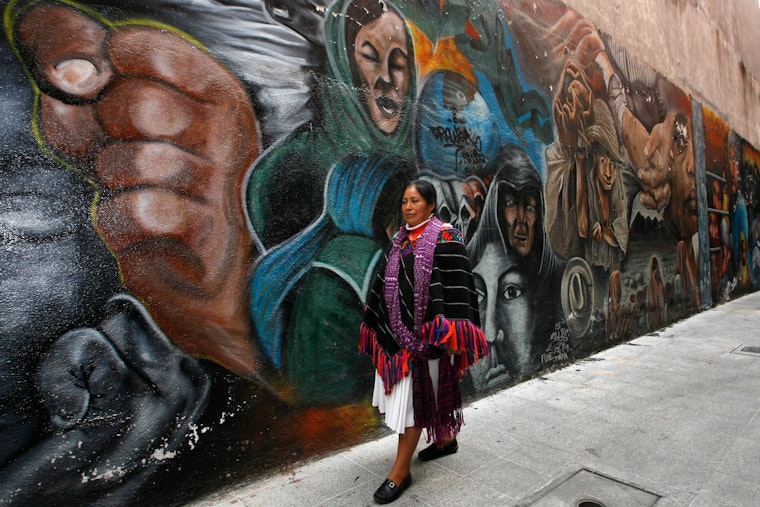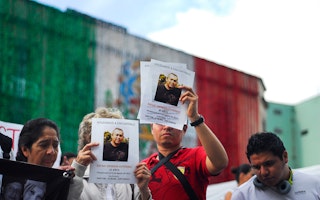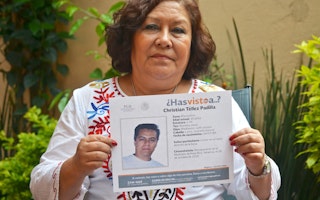How Mexican Human Rights Lawyers Found a New Route to Accountability
By Adriana García & Mercedes Melon Ballesteros

Mexico City’s Museum of Anthropology and History is world-renowned for its collection of Aztec and Mayan art, and for exhibitions on the modern culture of Mexico’s indigenous peoples. But on February 21, the museum provided the backdrop for an unprecedented modern ceremony: an official act of apology delivered to three indigenous women by representatives of the the federal prosecutor’s office, the Procuraduría General de la República (PGR), for the violation of their human rights.
The three women, Alberta Alcántara, Jacinta Francisco Marcial, and Teresa González, are members of the Hñä-Hñú (Otomí) people. In addition to the formal apology, they will also receive financial compensation for the wrongful prosecution and imprisonment they suffered over a decade ago at the hands of federal police and prosecutors in their home state of Querétaro. Their story, now nationally known, has also raised fundamental and still unresolved questions about the role and accountability of the PGR in Mexico’s criminal justice system.
The three women were first arrested and unlawfully detained in August 2006, four months after a fracas erupted in the marketplace of the town of Santiago Mexquititlán after the police tried to seize goods from indigenous vendors. All three women were falsely charged with the kidnapping of six federal police officers during the trouble (even though one of the accused—Jacinta Francisco Marcial—was attending mass and visiting the local pharmacy at the time of the alleged crime). The three were tried and convicted without the Hñähñu translator they should have been provided with under the law. Despite the lack of evidence against them, they were each sentenced to 21 years in prison.
It took three years of legal challenges by Centro Prodh, a leading Mexican human rights group, to secure the women’s release, and the overturning of the charges against them. Along the way, the case became emblematic of the failures of Mexico’s justice system to offer equitable access to justice to indigenous people.
But once the three were released from prison, the case also became the story of how Mexico’s PGR has been able to operate as a law unto itself—the victims of wrongful or malicious prosecution have no established mechanism for seeking redress or compensation for the losses they have suffered.
Nevertheless, Centro Prodh’s lawyers set out to get some form of redress for their three clients. In an innovative move, they resorted to Mexico’s administrative court system, and filed separate claims seeking reparations for damages under the state’s financial liability regime (Responsabilidad Patrimonial del Estado)—which makes government offices responsible for any damages caused to citizens. Subsequently, the Federal Court of Administrative Justice ordered the PGR to provide the three women with compensation, and the public apology that will be delivered at the Anthropology Museum.
The notion of prosecutorial accountability is well established in law, with internationally accepted minimum standards and obligations set out in the United Nations Havana Guidelines or the Standards of Professional Responsibility and Statement of the Essential Duties and Rights of Prosecutors. (The shortcomings of Mexico’s system were addressed in a February 2016 submission on this case by the Open Society Justice Initiative, which set out the state’s international human rights obligations to provide reparations where there is a violation of international human rights standards, including fair trial rights, and the need for an effective legal mechanism for claiming reparations.)
Nevertheless, the prosecutor’s office repeatedly fought the judgement of the administrative court, arguing that the ultimate responsibility concerning detentions and the bringing of criminal charges lies with the judges, not the prosecutors.
In this case, the PGR maintained, if the investigation was plagued with irregularities, it was the judge’s duty to detect and address them. Yet the PGR’s eventual decision to accept the decision of the first instance court on compensation and the apology established an important victory—which could lead to further damages cases in the future before the administrative courts that establish the principle of prosecutorial accountability for malpractice. An important feature of this approach is that the state agency responsible for the violation is responsible for providing the compensation, which should create incentives for the agency to put their own house in order.
In the meantime, the approach taken by Centro Prodh before the administrative courts offers a new way forward for victims of prosecutorial malpractice. While this does not represent full justice and accountability as required by international law, it is a first step not only to providing redress to victims of human rights violations, but also to holding institutions accountable.
Adriana García, a Mexican lawyer specialized in administrative law, works with the Open Society Justice Initiative on access to information and justice issues in Mexico.
Mercedes Melon is a senior legal officer at the Open Society Justice Initiative.

